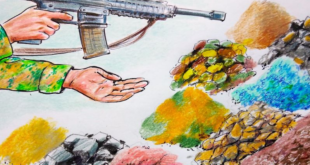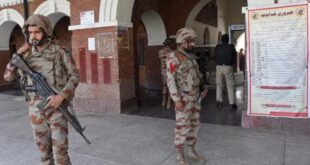The North Korean authorities have reportedly ordered the expansion of political prison camps in the country. A source told Daily NK that North Korea, having declared war on the so-called “anti-socialist and non-socialist phenomenon” during the recent Eighth Party Congress, intends to overhaul its incarceration facilities ahead of a major crackdown.
In a phone conversation with Daily NK on Feb. 12, the source, who is based in North Korea, said “the authorities ordered the labor camps to increase capacity at the end of last month,” adding that “this order was handed to the headquarters of all camps managed by the Ministry of Social Security and the Ministry of State Security.”
The source said that the authorities “are currently analyzing the prisoners in detail according to their ideological tendencies, past criminal records and current condition, in order to sort them by type of facility and labor intensity.” The source further said that “after this, there are comprehensive plans to proceed with land clearing for new coal and mining projects.”
North Korea has been reducing the number of existing camps due to strong criticism and monitoring by the international community. There are currently four known political prison camps run by the Ministry of State Security, while one camp is known to be run by the Ministry of Social Security. It is unusual for North Korea to push for expanding its facilities.
Daily NK has previously reported that the North Korean authorities have sent violators of COVID-19 quarantine rules to political prison camps on charges of harming the national economy and violating party policy. As a result, the number of prisoners have increased significantly, and in some areas, political prison camps have either been newly established or expanded.
However, as they are now planning to expand the total number of political prison camps, the move seems to aim at preparing a large-scale incarceration of lawbreakers who are not violators of quarantine rules.
North Korea has recently enacted the “anti-reactionary thought law,” and is punishing violators with heavy sentences such as hard labor and the death penalty.
It is also noteworthy that Kim Jong Un put strong education and discipline at the forefront of both the Eighth Party Congress and the second plenary meeting of the Eighth Central Committee of the Workers’ Party. Kim emphasized the need to get rid of “every form of anti-socialism, non-socialism, sectarianism, bureaucracy, corruption, tax evasion and all kinds of criminal acts.” Censorship and crackdowns are expected to be further strengthened throughout North Korean society.
North Korea may be attempting to send violators of the new law to political prison camps by conducting a large-scale crackdown on anti-socialism and non-socialism.
“The newly established Party censorship divisions will undertake a massive project to turn the entire country red [socialist]” and that “those who oppose the declaration of war against anti-socialism and non-socialism will be punished regardless of their position, merits or songbun status,” the source said, using a term to describe social status in the country.
The source explained that “the party and the judicial, counterintelligence and security agencies have decided to punish anti-socialist and non-socialist actors by treating them as anti-party and counter-revolutionary elements.”
The move can be interpreted as North Korea aiming to promote internal unity through a powerful crackdown on matters that could lead to people breaking away from the regime ideologically.
“The likelihood is high that anti-socialists and non-socialists will be detained without mercy in the political prison camps,” the source said, adding, “There is a considerable chance that people will be imprisoned just to set an example because the authorities need to produce results from the newly established institutions [camps].”
 Eurasia Press & News
Eurasia Press & News



